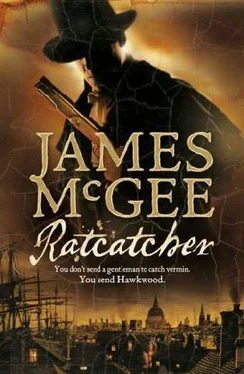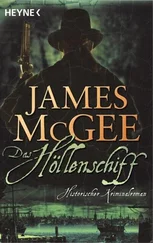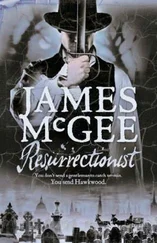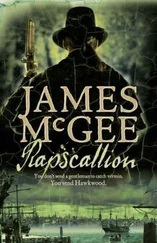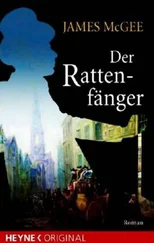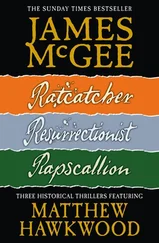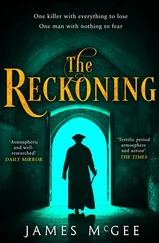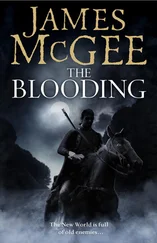James McGee - Ratcatcher
Здесь есть возможность читать онлайн «James McGee - Ratcatcher» — ознакомительный отрывок электронной книги совершенно бесплатно, а после прочтения отрывка купить полную версию. В некоторых случаях можно слушать аудио, скачать через торрент в формате fb2 и присутствует краткое содержание. Жанр: Исторический детектив, на английском языке. Описание произведения, (предисловие) а так же отзывы посетителей доступны на портале библиотеки ЛибКат.
- Название:Ratcatcher
- Автор:
- Жанр:
- Год:неизвестен
- ISBN:нет данных
- Рейтинг книги:4 / 5. Голосов: 1
-
Избранное:Добавить в избранное
- Отзывы:
-
Ваша оценка:
- 80
- 1
- 2
- 3
- 4
- 5
Ratcatcher: краткое содержание, описание и аннотация
Предлагаем к чтению аннотацию, описание, краткое содержание или предисловие (зависит от того, что написал сам автор книги «Ratcatcher»). Если вы не нашли необходимую информацию о книге — напишите в комментариях, мы постараемся отыскать её.
Ratcatcher — читать онлайн ознакомительный отрывок
Ниже представлен текст книги, разбитый по страницам. Система сохранения места последней прочитанной страницы, позволяет с удобством читать онлайн бесплатно книгу «Ratcatcher», без необходимости каждый раз заново искать на чём Вы остановились. Поставьте закладку, и сможете в любой момент перейти на страницу, на которой закончили чтение.
Интервал:
Закладка:
Hawkwood digested the information. “I presume you asked Mr Knibbs if he knew of Master Woodburn’s whereabouts?”
“Indeed I did, but he told me the master had left the workshop at his usual time. A little after half past five that would be.”
“Alone?”
“I did enquire if he’d left with anyone, but Mr Knibbs assured me he had not.”
“And how did Master Woodburn usually travel? By carriage?”
“No, it was his custom to walk, unless the weather was inclement. The master was-is-very fit for his age.” The manservant coloured.
Hawkwood ignored the slip. “When he left here that morning, did Master Woodburn say anything to you about meeting anyone?”
The manservant stiffened. “The master’s not in the habit of discussing his appointments with members of the household.”
It was the first sign of irritation that Hawkwood had witnessed. It was a reminder that, for all their concern at their employer’s absence and the obvious affection they held for his granddaughter, the Hobbs were, when all was said and done, not family but servants. And servants, more than anyone, knew their place.
“Nevertheless, it’s possible you may have overheard something.”
The look on the manservant’s face told Hawkwood he had committed another unpardonable error. It was as if he’d asked a priest to reveal the secrets of the confessional. But servants, Hawkwood knew, were privy to all manner of conversation and gossip, and thus a prime source of information. On this occasion, however, no revelations were forthcoming. The Hobbs were, it seemed, genuinely bewildered by their employer’s disappearance.
Following his visit to the workshop, the concerned manservant had retraced his steps, hoping his master had returned home in his absence. Finding that was not the case, Hobb had swiftly made his way to Bow Street where he had voiced his fears to Officer Warlock. The Runner had accompanied the manservant back to the Strand. By this time, two hours had passed since the Hobbs had felt the first flutters of apprehension and the household, understandably, was in some disarray.
Hawkwood eyed the servants speculatively. “And when Officer Warlock left you, did he reveal his intentions?”
“He told us he would be making his own enquiries at the workshop.”
“But it was late. The place would have been closed by then, would it not?”
“I assumed it was his intention to go there the next morning.”
“So that was the last you saw of him?”
The manservant nodded.
“Didn’t you think it curious that you hadn’t heard from Officer Warlock since then?”
The manservant looked embarrassed. “Well, to tell you the truth, Mr Hawkwood, we did wonder.”
“But you didn’t do anything?”
“We didn’t think it was our place.”
Hawkwood swore inwardly. But their reservations, he knew, were understandable. As servants, it was not the Hobbs’ responsibility to question police procedure. It was their function to go about their duties, unburdened by conscience or responsibility. Convention dictated that domestic staff were a breed that was seen, not heard.
Hawkwood gnawed his inner lip. The trail was growing colder by the minute. He glanced at the clock on the mantelpiece. It was almost half past four. He remembered he still had to meet Lomax at the Four Swans.
Clerkenwell and Red Lion Street, however, were not far. It was just possible that he could kill two birds with one stone.
Hawkwood wondered how old Isadore Knibbs was. The old man had a face like parchment and yet, despite his age, his eyes were as bright as a jackdaw’s. He was also very small. His hands were like the hands of a child, tiny and delicately formed. Only the web of veins visible under the semi-translucent skin betrayed their age. They also appeared remarkably supple for a person of his advancing years. Apart from failing eyesight, arthritis for a clockmaker, Hawkwood mused, must be the worst kind of infirmity.
Josiah Woodburn employed five journeymen, Isadore Knibbs being the most senior. He also employed two apprentices, the maximum allowed under the articles of the Clockmaker’s Company. There were ways to bend the rules, Mr Knibbs whispered, as he led Hawkwood through the workshop, a five-roomed gallery overlooking a courtyard at the corner of Red Lion Street and George Court, but Josiah Woodburn, a master clockmaker of impeccable repute, was, in that regard, totally beyond reproach.
“Forty years I’ve worked for Master Woodburn,” the journeyman volunteered proudly, “and a finer man I’ve yet to meet. Why, he even lets me sign my own work, and there’s not many would allow that.”
A rare honour indeed. Journeymen were generally not permitted to trade in their own right. Nor were they allowed to put their signatures on any kind of work, clocks or otherwise, even if their employer had never laid a hand on the finished instrument. Everything produced in a workshop was the property of the master. Which indicated Josiah Woodburn as an exceptional employer, albeit an absent one; a state of affairs for which Mr Knibbs could offer no rational explanation. The journeyman was as much in the dark as the Hobbs, and just as concerned. He confirmed that Master Woodburn had left the workshop at the usual time. No one had seen him since. But Mr Knibbs was perfectly willing for Hawkwood to look around the premises and talk to the other workers.
The premises were divided into separate workshops according to task, Mr Knibbs explained as he led Hawkwood through the cluttered carpentry shop. He gestured towards a row of hollow clock cases which lay against one wall like a line of upended coffins. Only the very best wood was used: pine and Honduran mahogany for the casing, oak for doors and bases, English walnut for the veneer. A solitary worker was bent over a saw-horse, ankle-deep in sawdust and wood shavings. The air was heavy with the smell of glue and freshly planed timber.
They walked through an archway and entered an adjoining work space containing several benches, each one strewn with clock innards, as if something mechanical had died and been disembowelled. The walls were hung with a bewildering array of charts and drawings showing cogs, wheels, rings, ratchets and pendulums in anatomical detail.
Not all the working parts were manufactured on the premises, Mr Knibbs confided. Some items were supplied ready-made. Springs, for example, along with spandrels, wheels and clock-plates. Although they possessed the knowledge, Mr Knibbs told Hawkwood, very few clockmakers cast their own brass. It was more convenient to obtain supplies from a brass founder. It was also possible, the journeyman muttered scornfully, to buy in ready-made movements but, thankfully, Master Woodburn belonged to the old school. Generally, he preferred the working parts to be assembled in his own workshops. This made it easier to control the quality of the finished product.
With the exception of the carpenter, the rest of the workforce laboured in silence, heads bowed, lips pursed in studious concentration. A couple of men looked up briefly at Hawkwood’s entrance before returning to their work. The two apprentices were easy to identify by their age, probably no more than thirteen or fourteen and no more than a few months into their term of indenture.
In the far corner of the gallery a pimply-faced youth was sweeping metal filings into a wooden tray. The boy was painfully thin, with a tar-coloured bonnet of hair that looked as if it had been attacked by a pair of blunt pruning shears. Hawkwood noticed that the boy dragged his left foot as he walked. The boy looked up, as if conscious that he was being observed. He gazed vacantly in Hawkwood’s direction before bowing his head to continue sweeping. Hawkwood saw that the lower part of the boy’s face was lopsided, as if the jaw had been dislocated and incorrectly reset. Hawkwood presumed this was the nephew, Quigley.
Читать дальшеИнтервал:
Закладка:
Похожие книги на «Ratcatcher»
Представляем Вашему вниманию похожие книги на «Ratcatcher» списком для выбора. Мы отобрали схожую по названию и смыслу литературу в надежде предоставить читателям больше вариантов отыскать новые, интересные, ещё непрочитанные произведения.
Обсуждение, отзывы о книге «Ratcatcher» и просто собственные мнения читателей. Оставьте ваши комментарии, напишите, что Вы думаете о произведении, его смысле или главных героях. Укажите что конкретно понравилось, а что нет, и почему Вы так считаете.
